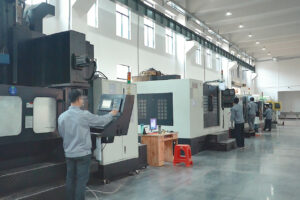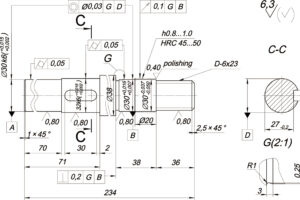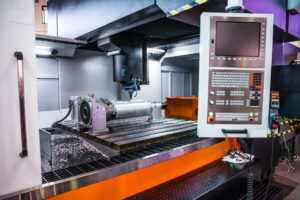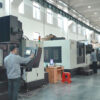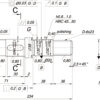Not all materials can be precision machined in precision parts processing. Some materials have too much hardness and exceed the hardness of the machined parts, which may break the parts, so these materials are not suitable for precision machining.
The materials for precision parts processing are divided into two categories – metal materials and non-metallic materials.
For metal materials, stainless steel has the highest hardness, followed by cast iron, followed by copper, and finally aluminum. The processing of ceramics, plastics, etc., belongs to the processing of non-metallic materials.
How to choose the suitable material for your part?
Please be careful about the hardness of the material. On some occasions, the higher the hardness of the material, the better, but it is limited to the hardness requirements of the machined parts. The material to be machined cannot be too hard. It will be impossible to process if it is more complex than the machined parts. The material is at least one grade lower than the hardness of the parts, and at the same time, it depends on the function of the processed parts and the reasonable selection of materials for the parts.
In short, precision machining has relatively high requirements on materials, and not all materials are suitable for processing, such as materials that are too soft or too hard; the former is not necessary for processing, while the latter cannot be processed.
Therefore, the essential thing is to pay attention to the density of the material before processing. If the thickness is too high, it is equivalent to a considerable hardness. If the hardness exceeds the hardness of the machine (lathe turning tool), it cannot be processed. Forcible machining will damage the parts and cause danger, such as the turning tool flying out and hurting people.
If you’re struggling with this, try sending a free project review, and we’ll give you expert advice on your parts.
What are the commonly used metal materials for precision parts?
1.6061 aluminum alloy
6061 aluminum alloy is a high-quality product produced by heat treatment and pre-stretching process. Although its strength cannot be compared with the 2XXX or 7XXX series, its magnesium and silicon alloys have many characteristics.
The material has excellent processing performance, welding characteristics and electroplating properties, good corrosion resistance, high toughness and no deformation after processing, dense material without defects and easy to polish, easy to color film, and excellent oxidation effect.
2. 7075 aluminum alloy
7075 aluminum alloy is a cold-treated forged alloy with high strength, far superior to mild steel. 7075 is one of the strongest alloys commercially available.
The material has excellent corrosion resistance, good mechanical properties and anodic reaction. The more refined grains provide better deep drilling performance, enhanced tool wears resistance and differentiated thread rolling.
3. Copper
Pure copper (also known as red copper) is a ductile metal with excellent electrical conductivity with a rose-red surface. It is not pure copper, it contains 99.9% copper, and some other elements are added to improve the texture and performance. It has good electrical and thermal conductivity, flexibility, profound draw ability and corrosion resistance.
Red copper’s electrical and thermal conductivity is second only to silver and is widely used in the production of electrical and thermal conductivity equipment. Copper has good corrosion resistance in the atmosphere, seawater and some non-oxidizing acids (hydrochloric acid, dilute sulfuric acid), alkali, salt solution and various organic acids (acetic acid, citric acid), and is used in the chemical industry.
Copper has good weldability and can be processed into various semi-finished and finished products by cold and thermoplastic processing.
4. Brass
Brass is a copper-zinc alloy, and brass composed of copper and zinc is called ordinary brass.
It has high strength, hardness and chemical resistance. There are also outstanding mechanical properties of cutting.
Brass has strong wear resistance. Unique brass, also called special brass, has high strength, hardness and chemical solid corrosion resistance. There are also outstanding mechanical properties of cutting.
5. C45 steel
C45 steel has high strength and good machinability. After proper heat treatment can obtain certain toughness, plasticity and wear resistance. The source of materials is convenient and suitable for hydrogen welding and argon arc welding.
6. 40Cr steel
40Cr steel is one of the most widely used steels in machinery manufacturing. It has good comprehensive mechanical properties, low-temperature impact toughness and low notch sensitivity. The hardenability of the steel is good. In addition to the quenching and tempering treatment, the steel is also suitable for cyanidation and high-frequency quenching treatment.
7. Q235 steel
Q235 steel is a carbon structural steel, and the Q in its steel number stands for yield strength. Typically, the steel is used directly without heat treatment.
Q235 steel will reduce its yield value with the increase of the thickness of the material. Due to the moderate carbon content, the all-around performance is good, and the strength, plasticity and welding properties are well-matched, and it is the most widely used.
8. SUS304 steel
SUS304 stainless steel has the characteristics of good processing performance and high toughness.
It has good corrosion resistance, heat resistance, low-temperature strength and mechanical properties, good hot workability such as stamping and bending, no heat treatment hardening phenomenon, and no magnetism.


